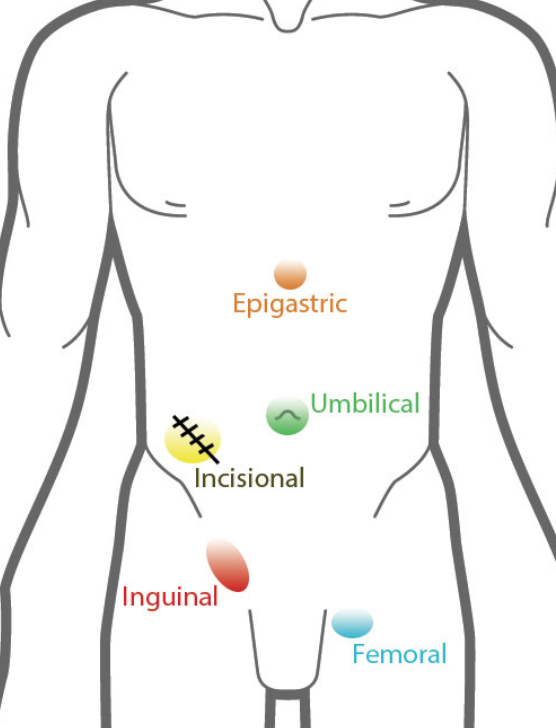Hernias 101
Hi steemit,
I'm a physician with a little bit of training left to do but I have enough people coming into the hospital and clinic with misinformation (Thank you, Dr. Google) that I wanted to try to do a couple posts a week on basic topics that might be helpful to the general population. Might also help you give you the motivation to get back to the doctor for a tune up :)
Hernias:
What are they?
- A weakness of the abdominal wall that allows intestines, fat, or other organs to pop through. In adults there are usually acquired via straining, pregnancy, or popping a prior surgical closure. In children, these are common and tend to represent a persistent opening of part of the abdominal wall.
Where are they?
- Several types: Inguinal, femoral, umbilical, incisional, etc. These are usually noted by a bulge, either painful or not, that is located in the groin, the belly button, or associated with a prior surgical scar.

Do I have one?
- Well if you have a bulge in any of the areas noted above, it could be a hernia. Generally they will also get better when you are laying down and relaxing the abdomen. Bearing down tends to make them larger. They may be either reducible or irreducible, meaning you can either pop it back in, or you can't.
What do I do about them?
If you suspect that you have one, you should go see your doctor. They will do some uncomfortable maneuvers to help determine if you have one or not such as poking/pushing and asking you to cough (raising that intra-abdominal pressure). I will tell you that some are harder to diagnose than others and it is really the bread and butter of a general surgeon. If you do not feel 100% comfortable with the answer you get from one doc, please go get a second opinion.
The big question is does it need to get fixed? Well, the answer to that is that it depends. We generally recommend to repair hernias that are symptomatic, that is, giving you some level of discomfort or making it hard for you to rock that speedo (not the right type of bulge). For the dudes there are plenty of hernias are just there hanging out and not bothering anyone and, generally, it is OK to leave them alone as noted in a trial back in 2006 by Fitzgibbons that showed there was a very low rate of incarceration or strangulation in asymptomatic inguinal hernias. For the dudets, these could represent femoral hernias so generally we recommend that they get repaired or a more thorough work up as these have a higher chance of becoming incarcerated.
All of this being said, the majority of patients in the study switched to the repair group because their symptoms got worse over time. So the usual recommendation is to get it done at some point when it will be convenient to be on light duty for a month or so. Another situation would be if you will be going somewhere out in the boonies, a foreign country, or the space station for an extended period of time...it would be awfully bad to need an emergency surgery.
Finally what is the best way to fix a hernia? A traditional open hernia repair VS a laparoscopic approach. There is a lot of data on this subject and the classic recommendation is for a first time, one sided inguinal hernia to get it done open. The thought being, if it recurs, you can get a laparoscopic repair. If you have them on both sides, a laparoscopic repair is generally recommended so you get a better look at what is going on. However, with laparoscopic surgery being so routine and the technique so refined, there is more data coming out showing that it is almost equivalent with respect to recurrence. So the best answer is to have the conversation with the surgeon and do what both you and he/she feels will offer the best chance at a durable repair. For the other types of hernias, such as umbilical and incisional hernias, there are so many factors at play, there is no one size fits all answer and it will definitely be a conversation with your surgeon.
This is meant to be informative, not medical advice. Please don't try to diagnose or fix your own medical problems, there are amazing medical professionals in your community who would love to help you!
If there are other topics you would like information on, please let me know and I will do my best to accommodate. If it's something I have NO knowledge about I have NO issue admitting it and hopefully another community member can come to the rescue. Please also let me know how i an improve my posts... more pictures, more science, less science, etc.
Citations:
Fitzgibbons RJ, Giobbie-Hurder A, Gibbs JO, Dunlop DD, Reda DJ, McCarthy M, Neumayer LA, Barkun JST, Hoehn JL, Murphy JT, Sarosi GA, Syme WC, Thompson JS, Wang J, Jonasson O. Watchful Waiting vs Repair of Inguinal Hernia in Minimally Symptomatic MenA Randomized Clinical Trial. JAMA. 2006;295(3):285–292. doi:10.1001/jama.295.3.285
Good information. A close family member had two hernia operations. One as infant (inguinal) and the 2nd as an adult. The 2nd was outpatient surgery with a mesh. I think it's important for a good physician/patient relationship so the patient knows exactly what will be happening during surgery. I'm happy to have you onboard with your expertise.
I had one done a few years ago and even as a medical student I didn't really know what I was getting myself into. Totally agree with you, communication is key!